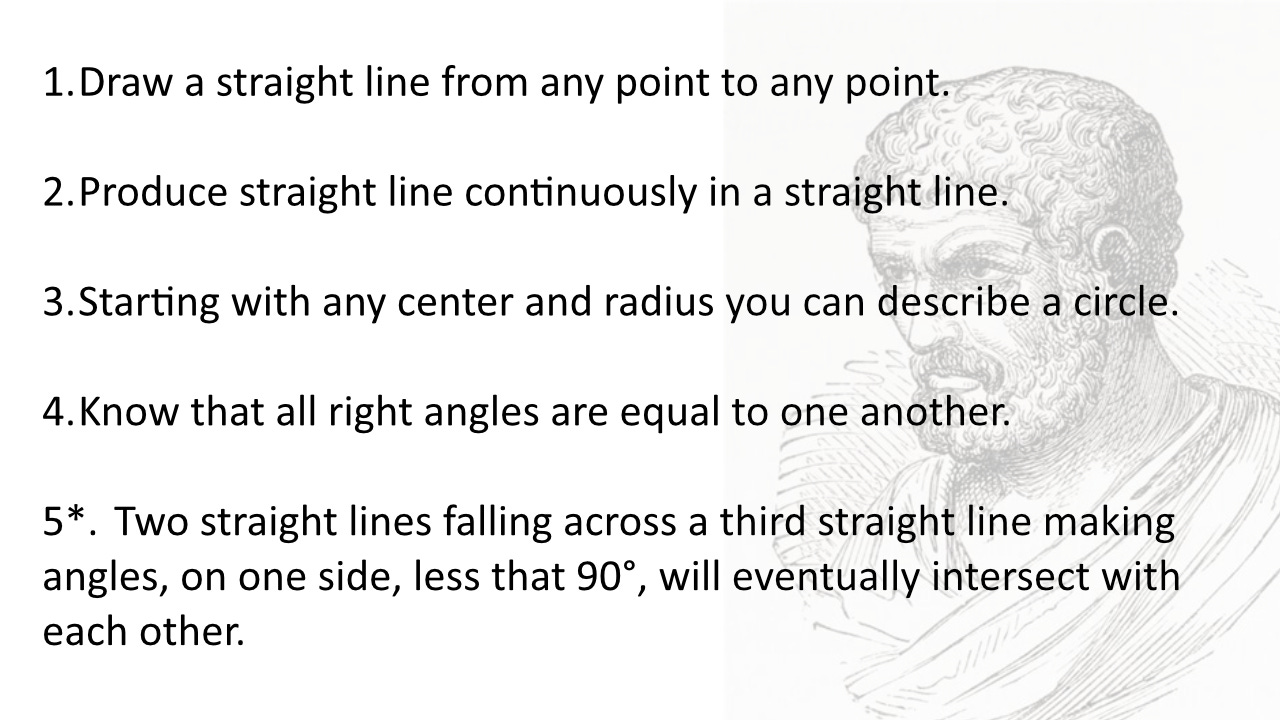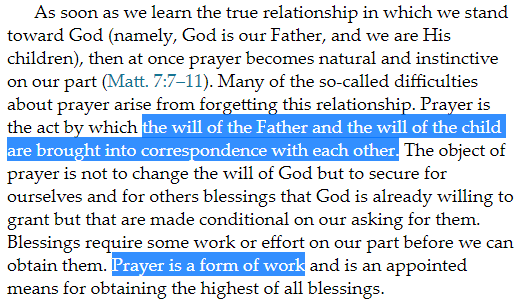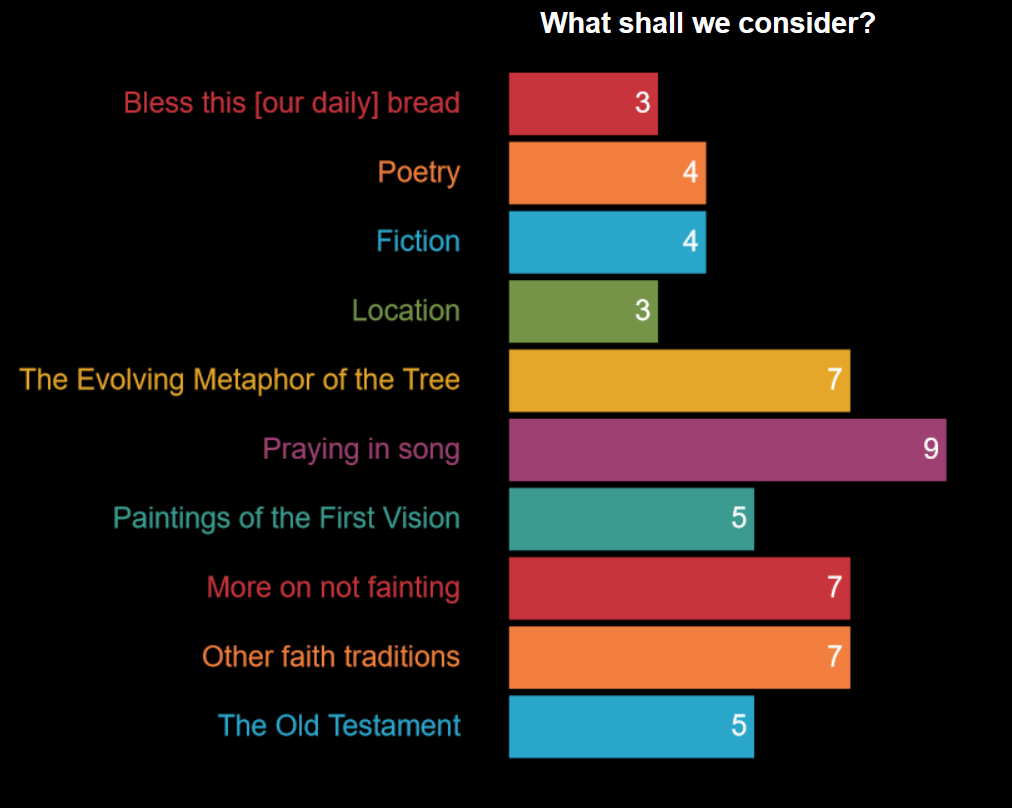.
Last time I shared the multiversal version of this presentation. But the first half was more or less the same each time I did it. It’s also available with my notes (it’s “z Outline v2”), but maybe this version (shorter, cleaner) will be an easier format to share.
----------------------------------------
We are children of God, children of creators, children of Heavenly Parents.
Before we get to my main point, let me remind you of two obvious things that maybe almost two years of Zoom have made fuzzy:
1. Class works best when people talk
a. Fifty brains are better than one. Even when that one is mine.
b. Turn to your neighbor and tell them how many masks you own.
2. Tangents are wonderful things
3. The real goal is to think new thoughts.
a. It doesn’t matter as much that we agree.
b. Let the Spirit in through the unfamiliar or the weird.
4. So speak, interrupt, propose.
At this point, I asked someone to grab the chalk and write on the board people’s favorite scripture stories. After they shared what they (you?) liked about that story, I did the same, with a focus on what makes that prayer unique in my mind. Some really fun examples came up, including Enos’s all-nighter, Hezekiah’s plea to live, the Lamanite king’s desire to know God, an alternate version of the First Vision, Nephi’s desire to see his father’s vision, Jesus’s prayers on the cross and in Gethesemane, and more more more. It’s a fun exercise. I recommend it.
I teach high-school English and one thing I have to do is cure people of the five-paragraph essay. Today, we’re going to dismiss the 5p-essay of prayer and discuss how to make the prayer take the shape of whatever is in our heart.
I suppose the 5p-essay of Latter-day Saint prayer is the four-part prayer we learned in primary or from the missionaries.
This not me knocking the primary prayer. Just questioning whether it’s really the right form for every prayer you ever say.
(Then we considered how well the prayers on the chalkboard matched the primary prayer.)
Great. Now let’s skip from English class to math class for a second.
Welcome to geometry class. (Not really, but the idea of sacred geometries is a pretty great thing to research if you get serious about more creative prayers.)
Let’s talk about Euclid, the father of geometry, dead lo these 2300 years.
His geometry relied on five axioms—ideas that seemed safe to assume and, having assumed them, on which the rest of geometry can be built. Euclid wasn’t sure that last one was true, but he felt he needed it in order to father geometry.
Now we have non-Euclidean geometry which presents a new way of understanding the world by rejecting Euclid’s axiom #5.
There are a lot of axioms in religion. I started us today with this one:
We are children of God, children of creators, children of Heavenly Parents.
Here are a couple others:
Bible dictionary bit
Abraham prays for Sodom and Gomorrah (I forgot this in both presentations!)
This aligning of wills isn’t so simple as just lying down and saying thy will be done in every single circumstance.
Isaiah 1: “Come now, and let us reason together,” says the Lord
Prayer is remembering to pray
Adam Miller, Letters to a Young Mormon
Remembering to speak AND remembering to listen
Pray always and not faint
D&C 88 126 Pray always, that ye may not faint, until I come. Behold, and lo, I will come quickly, and receive you unto myself. Amen.
D&C 75 11 Praying always that they faint not; and inasmuch as they do this, I will be with them even unto the end.
from Middlemarch:
Mr Bulstrode is a man who has lived most of his life trying to be as good as possible, donating money and being ostentatiously religious, etc. But his fortune is built on another man’s crimes and Mr Bulstrode did some shady stuff himself in order for it to fall to him.
Early in the morning—about six—Mr. Bulstrode rose and spent some time in prayer. Does any one suppose that private prayer is necessarily candid—necessarily goes to the roots of action? Private prayer is inaudible speech, and speech is representative: who can represent himself just as he is, even in his own reflections?
While we will speak mostly of words, words have their limitations. Prayer can and must, at least at times, be more.
But even more importantly, prayer cannot be more honest than we are with ourselves.
So our axioms are:
1. We are children of Heavenly parents
a. They are interested in us
b. We are creators like them
2. Prayer is an aligning of wills between us and deity
3. Prayer is remember to pray
a. Pray always and not faint
4. We pray as ourselves.
a. We thus must be honest in order to pray honestly.
(Note: because of directions the conversation took, sometimes these axioms had been slightly altered by this point.)
I’m proposing these as axioms but we’re all limited by what we can see. Perhaps one of these is like parallel lines.
And here’s something axiomatic about creativity:
Sometimes creativity is doing something new.
Sometimes it’s doing something old in a new way.
But even the most traditional of prayers can be creative—can be the right prayer at times.
The Lord’s Prayer (specifically, an anecdote about a woman in my growing-up ward who, giving the closing prayer at Church, who said this was an appropriate moment to pray via classic.)
Then I handed out the English version of Gabriel González Núñez fascinating experiment with the Lord’s Prayer (eng, esp) and we spent a moment with it, trying to hear these familiar words for the first time.
Now we will do something similar. Just as there are plenty of ways we can read the Lord’s prayer, there are plenty of ways we can finish this hour. I have multiple options for us. We’ll do one from each category until we run out of time.
And that’s when we did the voting!
(On which you can learn more by clicking on the poll. I only wish more people had followed the link and the voting, thus, would have been more fierce. Ah well.)
.png)



No comments:
Post a Comment